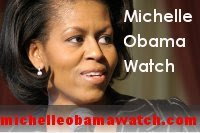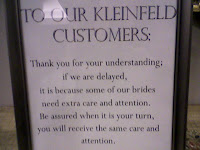 For those obsessed, like me, with how the media is and will cover Michelle Obama, do check out the new blog Michelle Obama Watch. The site is designed to be “a repository of all of the criticism, praise, and general chicanery thrown at Michelle Obama between now and November.” And for any who missed Michelle Obama on The View, here’s the clip:
For those obsessed, like me, with how the media is and will cover Michelle Obama, do check out the new blog Michelle Obama Watch. The site is designed to be “a repository of all of the criticism, praise, and general chicanery thrown at Michelle Obama between now and November.” And for any who missed Michelle Obama on The View, here’s the clip:
 On Wednesday, June 25 (tomorrow), New York Women in Communications is hosting a panel discussion that looks at how media has effected this historic presidential election. The event has a great title: “2008 ELECTION: THE ULTIMATE COMMUNICATIONS CASE STUDY.†From the press release:
On Wednesday, June 25 (tomorrow), New York Women in Communications is hosting a panel discussion that looks at how media has effected this historic presidential election. The event has a great title: “2008 ELECTION: THE ULTIMATE COMMUNICATIONS CASE STUDY.†From the press release:
How has the 2008 election changed the way information is received, discussed and processed? How has the media created buzz and changed the way the younger generation feeds on it? What has the 2008 election taught us about communicating?….The panel will include: moderator Jere Hester, director, NYCity News Service and former city editor, New York Daily News; Amanda Michel, project director, Off the Bus: Huffington Post; Keli Goff, author, Partycrashing: How the Hip-Hop Generation Declared Political Independence; Liz Nord, senior producer, MTV News; and Jodi Kantor, political journalist, The New York Times.
Where: CUNY Journalism School (219 West 40th Street, New York, NY 10018)
Time: 6:00 – 6:30pm: Networking and Refreshments
6:30 – 8:00pm: Panel Discussion
8:00 – 8:30pm: Networking Raffle
Fee: Members – $15
Non-members – $20
Registration: For more information and to register, visit www.nywici.org
 I met the most amazing woman, and the most amazing 3-legged dog, yesterday in the park coming back from a visit to the place I’ve come to call the fertility farm (alert! I am NOT fertility blogging, just mentioning where I was coming from is all). These two have a pretty amazing story, and, as it turns out, Scheki (the dog) and Lori (the human) were profiled in April on WCBS. Schecki is short for “Schekayanu,” the Jewish blessing of gratitude for reaching a happy occasion.
I met the most amazing woman, and the most amazing 3-legged dog, yesterday in the park coming back from a visit to the place I’ve come to call the fertility farm (alert! I am NOT fertility blogging, just mentioning where I was coming from is all). These two have a pretty amazing story, and, as it turns out, Scheki (the dog) and Lori (the human) were profiled in April on WCBS. Schecki is short for “Schekayanu,” the Jewish blessing of gratitude for reaching a happy occasion.
Finding Schecki, a victim of a bombing most likely, in Israel was a happy occasion, explains Lori in the clip. She also says: “Scheki has taught us to have this strength and love of life and not to look at what we don’t have, but rather look at what we do have in life, and embrace it with a passion and exuberance.”
Amen (and woof) to that.
 We knew this before, but a new study from Rutgers proves it yet again, and the NYTimes reports it: “Study Finds Imbalance on 3 Newspapers’ Op-Ed Pages”. In the words of Helaine Olen, “I’m shocked! Gambling at Rick’s!”
We knew this before, but a new study from Rutgers proves it yet again, and the NYTimes reports it: “Study Finds Imbalance on 3 Newspapers’ Op-Ed Pages”. In the words of Helaine Olen, “I’m shocked! Gambling at Rick’s!”
The authors of the study, Bob Sommer (who teaches public policy communications and is president of Observer Media, publisher of The New York Observer) and John R. Maycroft, a graduate student in public policy, got their data by combing through 366 opinion articles written by college teachers or researchers and published by three newspapers: The New York Times, The Wall Street Journal and The Star-Ledger, the largest-circulation newspaper in New Jersey. Their study will be published in the journal Politics and Policy. Read more about it here.
Calling all ye women: SUBMIT YOUR OPEDS! To learn how, come to Woodhull’s next nonfiction writing retreat on July 11-13, where Katie Orenstein of The Oped Project will be teaching oped writing–and I’ll be teaching nonfiction book proposals! More info here.
(And thanks, Helaine, for the early morning heads up!)
 Hey, GWP readers! This is new guest blogger, Elizabeth M. Curtis here. Loyal GWP readers might remember my previous posts that provided cultural critique and gender analysis. Well, now I’m returning to GWP – as a regular like Courtney Martin and Laura Mazer – to talk about blogging and you.
Hey, GWP readers! This is new guest blogger, Elizabeth M. Curtis here. Loyal GWP readers might remember my previous posts that provided cultural critique and gender analysis. Well, now I’m returning to GWP – as a regular like Courtney Martin and Laura Mazer – to talk about blogging and you.
Many folks want to get more active online and make web 2.0 tools work for them, their writing, their institutions or organizations, and their causes. But sometimes a lack of tech know-how gets in the way. So, I’ll be sharing the secrets of online activism and the blogosphere that I’ve learned since I started blogging way back in 2006 (ages ago in online time!). My goal is to break down the blogging basics and to demystify web 2.0 technology for the folks who can’t wait to get active online, in the blogosphere, and beyond. A “Blog U,” if you will.
My first two tutorials offered to “Blog U” students will focus on getting active online and deciding whether or not you’re blog-ready. I’m looking for future tutorial topics as well. Let me know what you’re interested in exploring in the comments section or email me your queries.
Also, I’ll be cross-posting my “Blog U” posts on my own blog. Stop by for PDFs of “Blog U” material. Next post coming in just a few days…Stay tuned.
 Before signing off for the weekend, I’m feeling compelled to share with you this sign I saw at Kleinfeld Bridal, where yesterday I went with my cousin Jen to hunt for a crinoline. The small print reads, “Thank you for your understanding; if we are delayed, it is because some of our brides need extra care and attention. Be assured when it is your turn, you will receive the same care and attention.”
Before signing off for the weekend, I’m feeling compelled to share with you this sign I saw at Kleinfeld Bridal, where yesterday I went with my cousin Jen to hunt for a crinoline. The small print reads, “Thank you for your understanding; if we are delayed, it is because some of our brides need extra care and attention. Be assured when it is your turn, you will receive the same care and attention.”
Um, bridezilla much?
Some of those women there Freaked. Me. Out. Including the attendant who said “that’s your dress? and you’re the bride?”, pointing to the $200 blue number I bought at the bride’s maid store on 14th Street. If it weren’t for the utter coolness of Susan, the “attendant” who was assigned to me and who happened to be a Broadway costume designer moonlighting as a Kleinfeld’s outfitter, I think I would have run screaming. Instead, I stayed, and got tips from Susan and the ever-savvy Jen about what else women in the 1950s wore. And I left there loving my little blue number all the more.
 This week my colleagues at the Council on Contemporary Families released a briefing paper, “Families and the Current Economic Crisis,” examing the maelstrom of financial dilemmas facing Americans today, along with the far-reaching human impact. The report is available at www.contemporaryfamilies.org. Here’s a quick rundown of the different effects of the current economic crisis by age, race, and gender:
This week my colleagues at the Council on Contemporary Families released a briefing paper, “Families and the Current Economic Crisis,” examing the maelstrom of financial dilemmas facing Americans today, along with the far-reaching human impact. The report is available at www.contemporaryfamilies.org. Here’s a quick rundown of the different effects of the current economic crisis by age, race, and gender:
Gender
Men and women are affected by the job market cuts differently. In the recession of 2001-2004, women lost jobs at a higher rate than men. Today the reverse is true. From November 2007 through April 2008, men lost 700,000 jobs, especially in traditional “family-wage” occupations such as manufacturing and construction. Women, by contrast, gained almost 300,000 jobs, since female-dominated fields such as health care have remained strong. No one is “winning” any gender battles here, though. The pay gap between men and women had been narrowing for several years, but this past year it began to widen again. And in families where women have become the main providers, the results are mixed. Some families report increased respect by husbands and children for women’s economic contributions. But men who have a strong identification with the “male breadwinner” role experience a decline in marital quality when their wife begins to bring in a larger share of family income.
Age
Thirty million Americans are over age 65, and with the average social security payment set at $1,079, there is not much of a margin to cover rising medical, prescription, food, and gas bills. Since more than a third of retired Americans help their children financially, according to a recent AARP poll, their financial troubles may trickle down to their children and grandchildren as well. The AARP reports that the majority of baby boomers (aged 44-62) say they are struggling to make ends meet. Sixty percent have cut back on extras and 25 percent report having trouble paying their mortgage. Young adults aged 25-35 have their own issues. Many are still paying off student loans, and 35 percent are not saving for retirement at all.
Race
As is so often the case, African Americans and Hispanics are at higher risk both for job loss and foreclosure than are whites. Studies consistently show that even where black and white families earn the same yearly income, African-Americans have much lower levels of accumulated wealth, largely because their mobility has been more recent and they did not inherit homes or assets from earlier generations. More than half of all mortgages granted to African Americans in 2006 were sub-prime. In fact, a family living in an upper-middle class African American neighborhood is twice as likely to have a sub-prime mortgage as a lower-middle class white family. Hispanics were also over-represented in the sub-prime housing market. Given the continuing residential segregation in America, foreclosures on such homes will disproportionately affect African-American and Hispanic neighborhoods.
For more information, please contact Stephanie Coontz, Professor of History and Family Studies, The Evergreen State College, Olympia, WA (coontzs@msn.com; 360 556-9223).
 This just in, via Patti Binder: As part of the 3rd Annual New York State Day to End Commercial Sexual Exploitation of Children, Girls Education and Mentoring Services (GEMS) has reserved a limited amount of complimentary tickets for guests that are still interested in attending the screening of VERY YOUNG GIRLS. Email Makia Kambon at Makia@gems-girls to reserve one of the complimentary tickets today.
This just in, via Patti Binder: As part of the 3rd Annual New York State Day to End Commercial Sexual Exploitation of Children, Girls Education and Mentoring Services (GEMS) has reserved a limited amount of complimentary tickets for guests that are still interested in attending the screening of VERY YOUNG GIRLS. Email Makia Kambon at Makia@gems-girls to reserve one of the complimentary tickets today.
Screening of VERY YOUNG GIRLS &
Youth Leadership Panel
Friday, June 20th at 6:30pm
6:30pm: Hear directly from the members of GEMS as they discuss their leadership role in the movement to end CSEC. All attendees will receive a copy of GEMS White Paper on Youth Leadership in the Movement to End Commercial Sexual Exploitation, funded generously by the Ms. Foundation.
7:30pm: Attend a special screening of the SHOWTIME/Swinging T documentary VERY YOUNG GIRLS. This documentary highlights the experiences of the girls that GEMS serves. This compelling film provides an opportunity to hear the girls’ tell their own stories in their own words. Co-sponsored by the Fordham Institute for Women and Girls.
Tickets for Screening**:$25 General Admission
$10 Students/ Non-Profits
Click here to RSVP and purchase tickets online.
 Join me at the next Woodhull Nonfiction Writers Retreat, where I’ll be teaching a day on writing nonfiction book proposals. If you register now, there’s a Special Early Bird Rate. Here’s the scoop:
Join me at the next Woodhull Nonfiction Writers Retreat, where I’ll be teaching a day on writing nonfiction book proposals. If you register now, there’s a Special Early Bird Rate. Here’s the scoop:
Women are underrepresented as nonfiction authors and opinion writers. In a long weekend of writing instruction and one-on-one critique from expert instructors Kristen Kemp, Catherine Orenstein, and Deborah Siegel, participants gain fundamental knowledge of Op-ed pieces, features, book proposals, and pitching ideas.
Substantial discounts are also available to alumnae and members. To register, click here. For more info, email Elizabeth at ecurtis@woodhull.org.
 This week I was interviewed for a Page 6 story (by a writer I trust!) on divorce parties. Yep, word has gotten out that I had me one of those, and you can soon, gulp, read about it in the New York Post a week from this Sunday. In the meantime, here’s an interesting post from Rebecca Honig Friedman over at Jewess about Jewish women writing their own get (the Jewish divorce certificate). That would have been a nice thing to do, seeing as how my Jewish divorce experience was far more painful than the civil one, just because of the way it’s traditionally set up. What saved me? Bringing Daphne to the “unceremony” with me. Daph sat by my side and reminded me it was just a role in an ancient play. But that whole get experience was what prompted me to reclaim the ritual by staging a little ritual of my own invention which…well, more bout that on Page 6!
This week I was interviewed for a Page 6 story (by a writer I trust!) on divorce parties. Yep, word has gotten out that I had me one of those, and you can soon, gulp, read about it in the New York Post a week from this Sunday. In the meantime, here’s an interesting post from Rebecca Honig Friedman over at Jewess about Jewish women writing their own get (the Jewish divorce certificate). That would have been a nice thing to do, seeing as how my Jewish divorce experience was far more painful than the civil one, just because of the way it’s traditionally set up. What saved me? Bringing Daphne to the “unceremony” with me. Daph sat by my side and reminded me it was just a role in an ancient play. But that whole get experience was what prompted me to reclaim the ritual by staging a little ritual of my own invention which…well, more bout that on Page 6!

